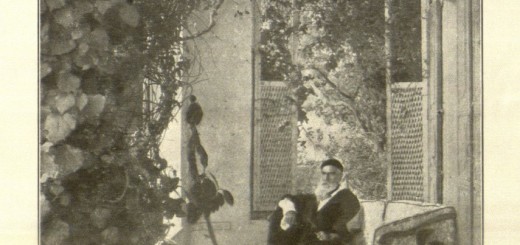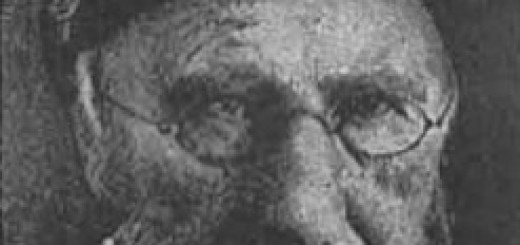Willem J. de Wit: An Invitation to Read Herman Bavinck in the Middle East
This article has been published as: Willem J. de Wit, “An Invitation to Read Herman Bavinck in the Middle East,” Cairo Journal of Theology 1 (2014): 36–48 (pdf). The pdf contains footnotes and page numbers.
Jesus did not come to judge the world, but to save it (John 3:17); the monk leaves the world and judges it by going to the desert. Jesus isolated himself in a deserted place early in the morning (Mark 1:35) to strengthen himself for daily work and his life work; the monk sees the essence of virtue in ascetic exercise itself and changes means into goal.
—Herman Bavinck
Who Wrote Bayna al-ʿaql wa-al-īmān?
Bayna al-ʿaql wa-al-īmān is the Arabic translation of a popular presentation of the Christian faith written by the Dutch theologian Herman Bavinck (1854–1921). While there has been a renewed interest in Bavinck in Reformed and Presbyterian circles from North America through Italy to South Korea since the last decade, he still seems to be relatively unknown in the Arabic speaking world. This article is an invitation to Christians in the Middle East to read more by and about Bavinck in English (or—ideally—in Dutch) and to consider the translation of some of his other works into Arabic.
For, while Bayna al-ʿaql wa-al-īmān will easily be recognized as a fair elaboration of the faith of the Reformed/Presbyterian confessions, it should be clear that Bavinck’s oeuvre includes many other writings that are arguably more important and interesting. After a brief sketch of his life, this short article will introduce some of his personal letters, his major four-volume Reformed Dogmatics, his works on worldview and education, and his reflections on following Jesus Christ, suggesting how these themes can be relevant for Arab readers and Egyptians in particular.
Bavinck’s Life
Bavinck was born in Hoogeveen, the Netherlands, on December 13, 1854. He and his family did not belong to the major Dutch Reformed Church, but to a smaller, theologically more conservative Reformed denomination, which had its own seminary in the town of Kampen. This denomination was rooted in the 1834 secession from the main church and Bavinck’s father was one of its pastors. From 1874 to 1880 Bavinck studied in Leiden, in those days the bulwark of modern, liberal theology in the Netherlands. In 1880 Bavinck completed his studies with a thesis on the ethics of the reformer Huldrych Zwingli (1484–1531). After a pastorate from 1881 to 1882 he became a professor in Kampen. In 1891 he married Johanna Adriana Schippers and after three years the couple had a daughter.
In 1880 Abraham Kuyper (1837–1920), another famous Dutch theologian, founded the Free University in Amsterdam. In 1886 he was one of the leaders of a second secession from the Dutch Reformed Church. In 1892 most churches of the 1834 and 1886 secessions united to form the Reformed Churches in the Netherlands. The new church now had two places to train future pastors: the seminary in Kampen and the faculty of theology of the Free University. Bavinck made strong efforts to merge the two, but when these failed in 1902, he moved to Amsterdam and became a professor at the Free University in succession to Kuyper, who had become prime minister of the Netherlands in 1901. In 1911 Bavinck himself became a member of the Upper Chamber of the Dutch Parliament. He died on July 29, 1921.
Although the details of Dutch church history may not be immediately relevant for readers of Bavinck in other parts of the world, his rootedness in the tradition of the secession (“I am a child of the Secession and I hope to remain so”) means that he did not understand himself as a representative of the dominant culture of his day, but rather of the subculture or counterculture of a minority. In fact, this may make it easier for (Protestant) Christians in the Middle East to identify with him.
Letters
“Will I remain standing? God grant it!” wrote Bavinck in his diary on September 23, 1874, the day he arrived in Leiden to study theology. This struggle to remain standing as a Christian while many of his contemporaries drifted away from the cross is a theme that underlies many of Bavinck’s works and comes more to the surface in some of his letters.
A particularly interesting starting point to begin one’s reading of Bavinck is his correspondence with Christiaan Snouck Hurgronje (1857–1936), with whom he became close friends during his studies in Leiden and who would become one of the leading Western specialists on Islam—his trip to Mecca in 1885 made him famous throughout Europe. The friendship lasted until Bavinck’s death. While the letters give us some insight into Bavinck’s views on Islam, one can especially learn from them that even (or perhaps, especially) a pastor and a theologian may have to struggle with doubt and halfheartedness. For example, reflecting on his studies in Leiden Bavinck wrote:
The innocence of a child’s faith, of the unlimited trust in the truth that has been instilled in me, you see, that is what I have lost and that is much, very much. . . .
I know that I will never regain it. . . . Sometimes, when I still meet some people in the congregation, who possess it and fare so well by it and are so happy, well I cannot help, but I wish I could believe again as they do, so happily and so cheerfully; and then I feel that, if I had this and could preach in such a way, animated, warm, always fully convinced of what I was saying, yes one with it, indeed, then I would be strong, powerful, then I could be useful; living myself, I would live for others.
But I know that it is over, that it is no longer possible.
And a few years later he confessed:
Sometimes I perceive in my own soul an unspoken desire that Scripture might not be true, that the newer criticism might be right, and in this I see something of that secret enmity that the sinful heart feels against the Holy One and that can only be overcome by faith and prayer. . . . Exactly this experience of the soul, in connection with others, ties me to Scripture and confession, although I feel in my mind the objections that can be brought against Christianity as deeply as you do.
This is not to say that Bavinck lost his faith or was always struggling. One of his students remembered:
He did much more than mere teaching. As a Christian he was able to make one feel the width and glory of God’s revelation in Christ, to make one realize the limits of the temporary over against the eternal, to make one look forward from knowing in part to the day of the full solution of the mystery. He carried one away to kneel before the throne of the Lamb.
Bavinck’s letters can offer readers a mirror in which to face their own struggles and that reading them together, for example as students or as pastors, can open a conversation about questions that are otherwise not so easily shared.
Dogmatics
Bavinck’s main contribution to Reformed theology is his four-volume Gereformeerde Dogmatiek [Reformed Dogmatics], originally published from 1895 to 1901, revised from 1906 to 1911, and published in English from 2003 to 2008 and in Korean in 2011.
While Bavinck was well-versed in Reformed theology of the sixteenth and seventeenth centuries, he also had a clear affinity with patristic and medieval theology: “Men like Irenaeus, Augustine, and Thomas do not exclusively belong to Rome. They are Fathers and Doctors to whom the whole Christian church has obligations.” This “catholic” (ecumenical) basis may make his dogmatics interesting even for orthodox churches in the Middle East. While Bavinck did not see Calvinism as the only truth and spoke about John Wesley with appreciation, his discussion of Israel and the millennium in his chapter on eschatology follows the main stream of the Reformed/Presbyterian tradition and may be especially appreciated by those who are concerned about the influence of dispensationalism among Protestants in the Arab world.
Bavinck’s doctrine of Scripture has especially drawn much attention. While he himself admitted by the end of his life that “the problem of Scripture” still waited a solution, his contribution is important as an attempt to get rid of a mechanical (“dictation”) view of inspiration and to replace it with an organic view of inspiration, which recognizes the specific circumstances and personalities of the biblical authors without diminishing Scripture’s authority as the Word of God. My impression is that Bavinck can help Christians to articulate their distinct understanding of inspiration in a context in which the dominant model for inspiration is that of the sending down of the Qur’ān from heaven.
While the mystical union with Christ has been proposed as the main theme of Bavinck’s dogmatics and was perhaps an important point in his own spiritual life as well, more often the phrase “grace restores nature” is seen as the central theme. Grace, Bavinck taught, does not alienate us from (earthly) life in general, but redeems it from the consequences of sin and will eventually bring it to completion.
Worldview and Education
Although Bavinck is best known for his Reformed Dogmatics, he did not see dogmatics as the be all and end all of Christianity. In his view (Reformed) Christians should engage in all areas of culture. In an early article he wrote:
The Reformed is a complete view of world and life. It puts humans in a special relationship to God and therefore also in a specific relationship to all things: to family, state, society, art, science, etc. Besides dogmatic principles, there are also moral, political, social, scientific, and aesthetical principles. Nothing exists on which Reformed principles do not put their peculiar mark.
These words anticipate much of what Bavinck would later write, especially during the last two decades of his life. In 1904 he published a book entitled Christelijke wereldbeschouwing [Christian Worldview] and many of his other books and articles can be read as elaborations of his Christian worldview for a specific area of life, for example the family, ethics, the sciences, social relationships, and aesthetics.
His works on education deserve special mention. His Paedagogische beginselen [Principles of Education] has been called as relevant for Christian philosophy of education as Calvin’s Institutes were for subsequent theology. Interacting with the leading educational theories of his time, he developed a distinctly Christian view of the goal, starting point, and method of education. A key verse for him was 2 Timothy 3:17: “… that the man of God may be complete, equipped for every good work” (ESV).
Whether one agrees with his position or not, his works can open the eyes of Christians to the reality that fundamental reflection on education from a Christian perspective is possible. In a context in which some groups seek to put a more distinctively Islamic stamp on school education, Bavinck’s work can stimulate Christians to reflect on and articulate their own ideal of education.
Following Jesus Christ
Following Jesus Christ is an important theme in Bavinck’s life. In the diary that he wrote during his studies in Leiden he repeatedly expressed the hope that he would be a “worthy follower of Jesus.” On two occasions he wrote about “the imitation of Christ” (following Christ) in more detail: in a series of articles in 1885–1886 and in a brochure in 1918. In 1886 he criticized the monastic ideal of imitation: “Jesus did not come to judge the world, but to save it (John 3:17); the monk leaves the world and judges it by going to the desert. Jesus isolated himself in a deserted place early in the morning (Mark 1:35) to strengthen himself for daily work and his life work.”
Although Bavinck’s remark about the monk in the desert might suggest that he had Saint Anthony and the Coptic Orthodox Church in mind, it is much more likely that this “monk” refers to the many in his own Reformed denomination who, in his view, thought “too exclusively.” He saw the tendency to leave the world symbolized in the seminary in Kampen: it was not a university but only a separate seminary, and it was not in a real city but only in the small town of Kampen. His ideal was a Christian university and he saw this ideal partly realized in the Free University. Writing to Snouck Hurgronje, he emphasized that his work on the catholicity of the Christian faith—in the sense of its relatedness to all areas of life—was intended as a “medicine against the separatist and sectarian tendencies that sometimes show up in our church.” He added, “There is so much narrow-mindedness and so much pettiness among us, and, worst of all, this is counted as piety.”
In 1900 Bavinck reviewed Charles Sheldon’s famous book, In His Steps: What Would Jesus Do?, remarking that the question posed in its subtitle not well formulated:
Jesus did not occupy a post in society and did not hold an office in church or society. He was neither a husband nor a father of a family, neither a farmer nor a merchant, and neither a scholar nor an artist. . . . He was something else and infinitely more: He was the Redeemer of sinners, the Savior of the world.
For this reason, the question “what would Jesus have done in my case?” is not well posed . . .
. . . If one cannot imagine that Jesus would have been a husband or a father of a family—and that cannot be imagined indeed—, one might decide to abstain from marriage or to leave one’s family and to do nothing but traveling through the country, preaching and performing miracles.
. . . The true meaning of following Jesus is not that we copy and imitate him, . . . [but] that we, independent and free, as God’s children, in our circumstances and relationships, even if it costs us the greatest self-denial and bearing the heaviest cross, fulfill that same will of God which Christ . . . fulfilled in a perfect way. For whoever does God’s will is Jesus’ brother and sister and mother.
During the first decade of the twentieth century, Bavinck dealt intensively with the problem that the Christian faith is contested at an intellectual, academic level, a struggle that resulted in his 1908 lectures on The Philosophy of Revelation. In his brochure on the imitation of Christ ten years later, when the First World War was in its fourth year and he had been a member of the Upper House of the Dutch parliament for seven years, he located the crisis of Christianity’s plausibility much more in everyday moral life than in academic discourse:
All these questions come together in the question about the imitation of Christ and life in the modern world. Is there still room for such an imitation in the cultural life of the present? Can it still be taken seriously by people in the state, in industry and business, in the marketplace, the stock-exchange and the bank, in office and factory, in science and art, in war and at the front?
While Bavinck was critical of the spirit of the French Revolution, it is hard to say where he would have stood exactly in the case of the Egyptian revolution of 2011. However, it is clear that he would have recommended that Christians neither seclude themselves from the world in the monasteries of St. Paul and St. Antony, except perhaps for a short retreat, nor withdraw themselves to the confines of an evangelical seminary or a Protestant church, but face the question, difficult as it may be, of what it means to follow Jesus Christ at Midan Tahrir, in a system that is still vulnerable to corruption, or in a public sphere that is—even more than before—dominated by a different religion. PDF



